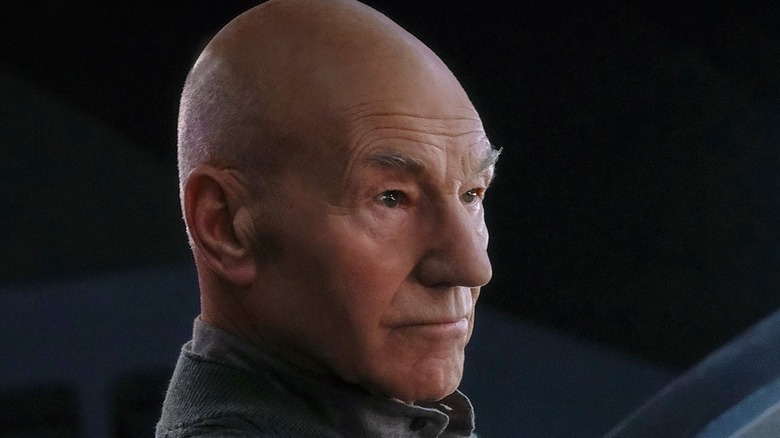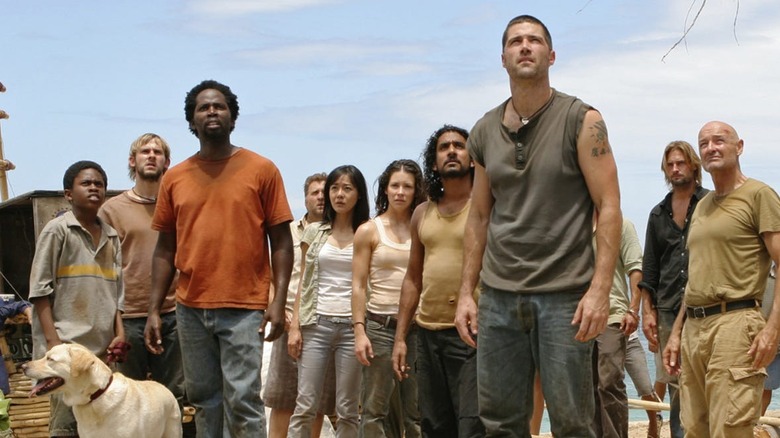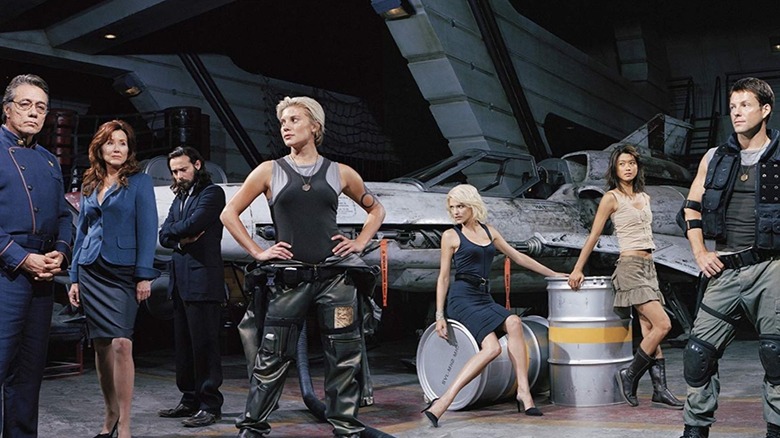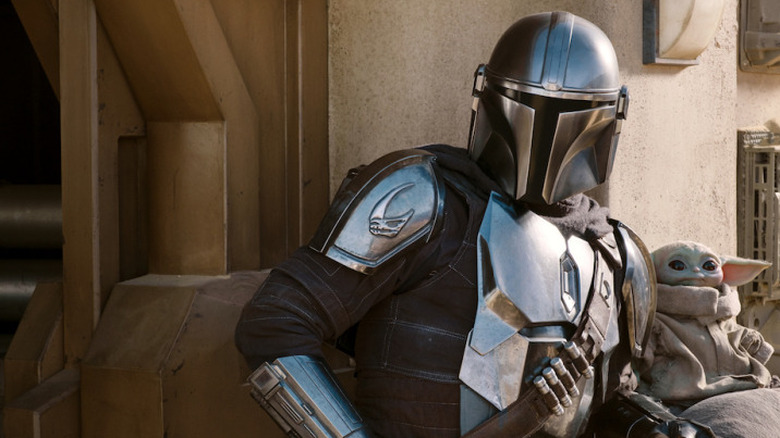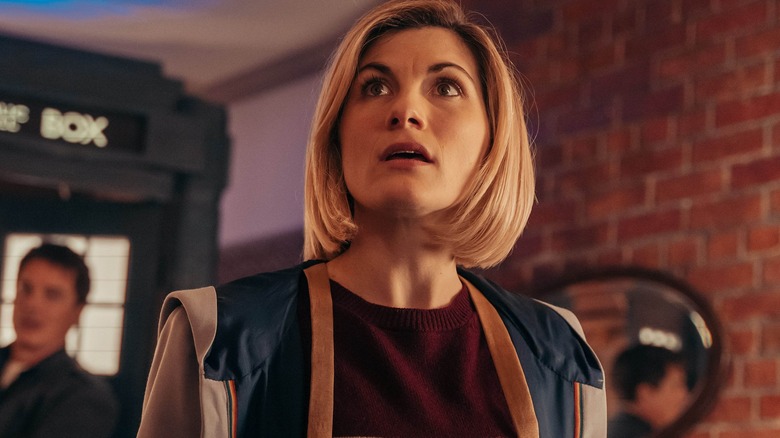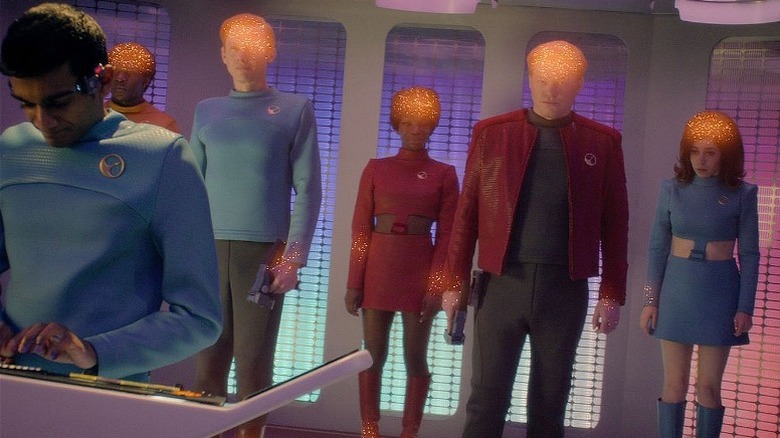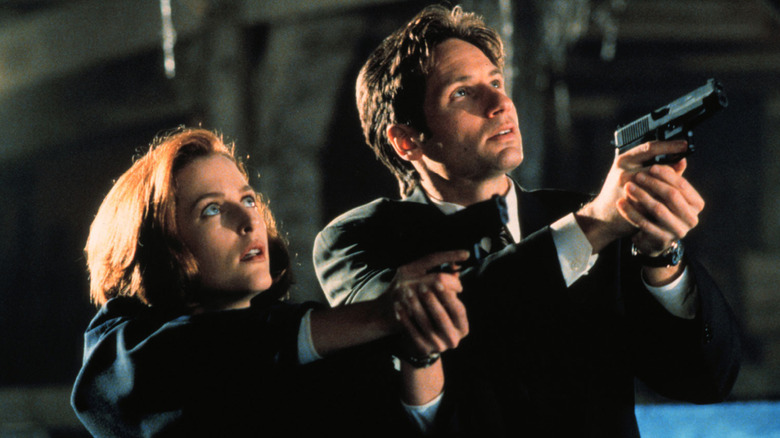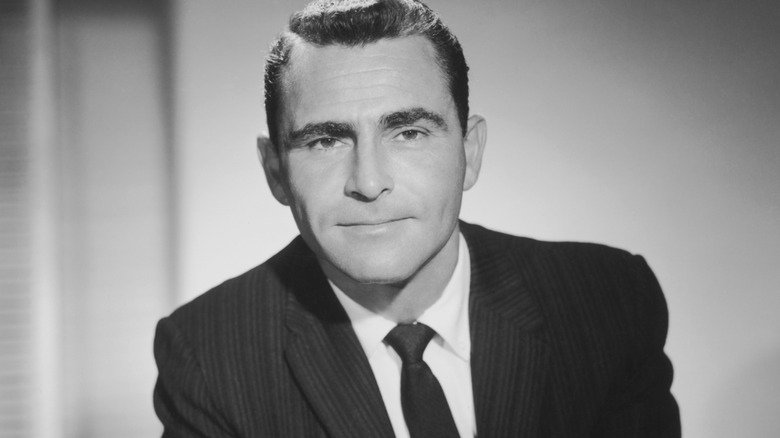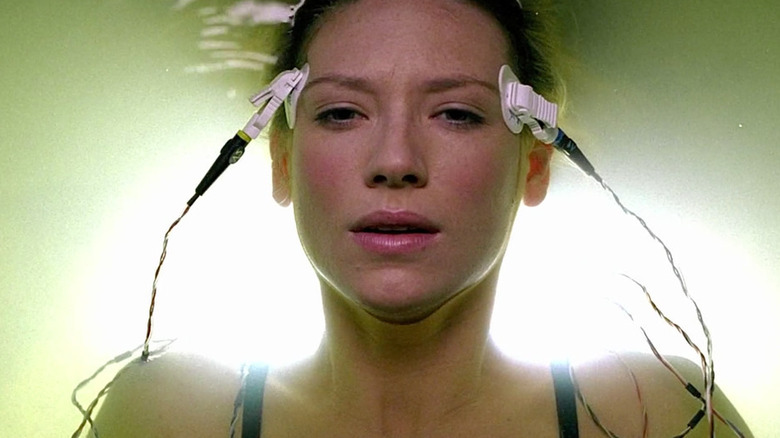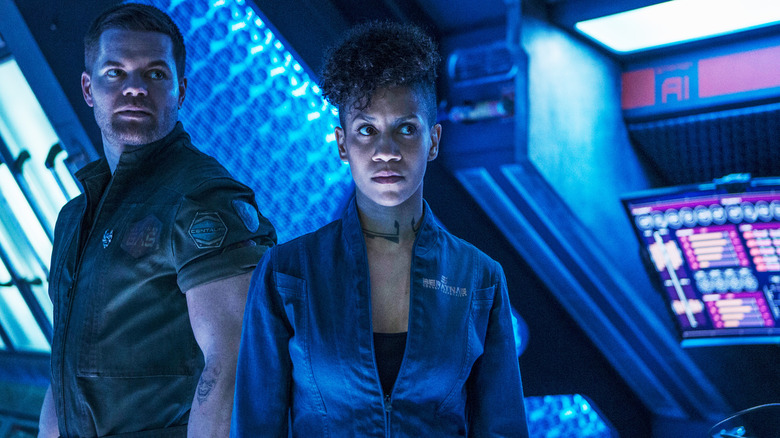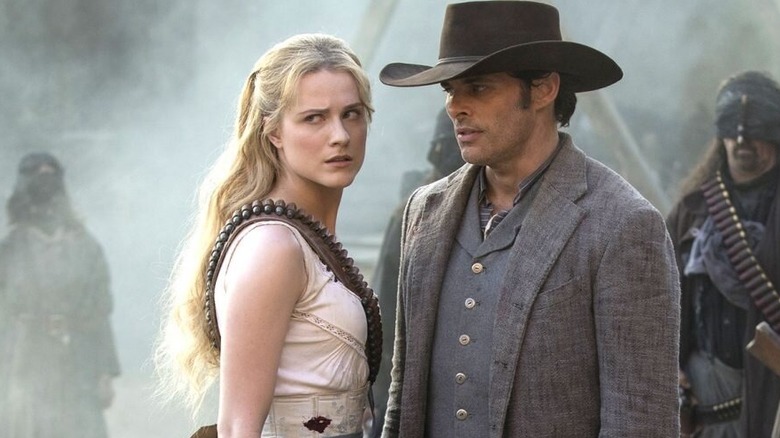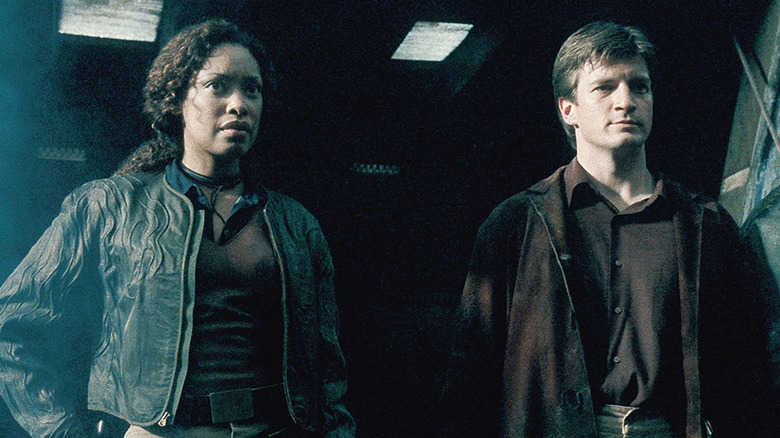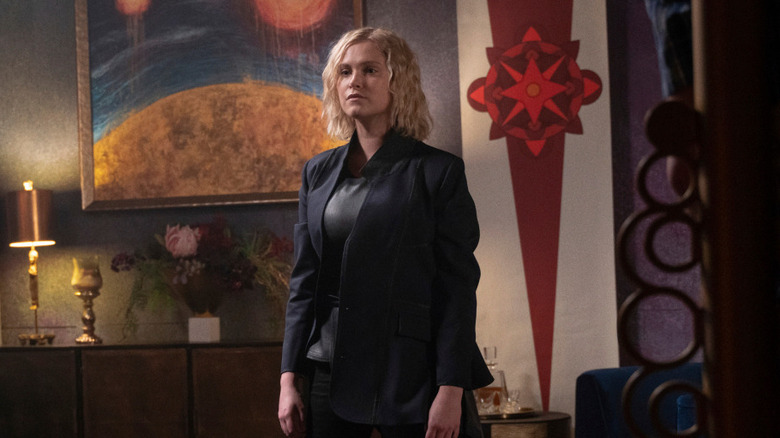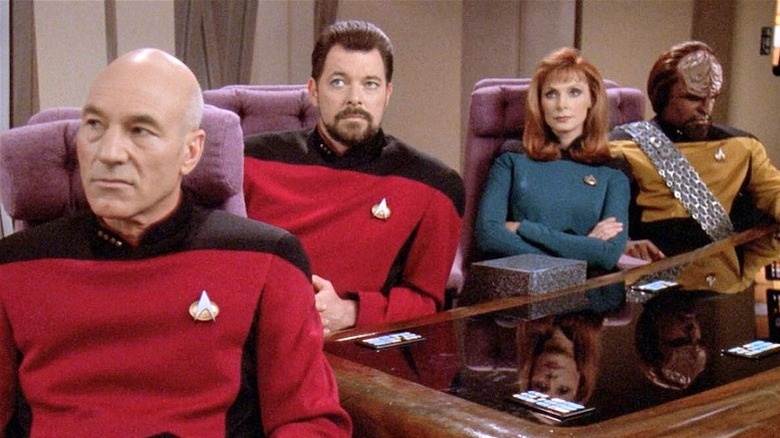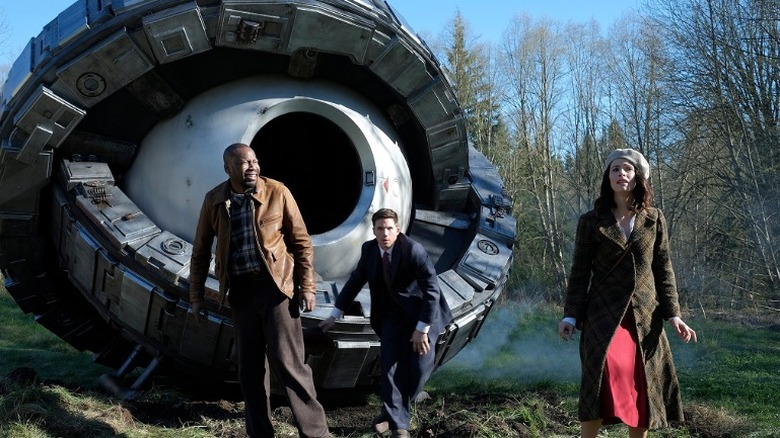Most Binge-Worthy Sci-Fi Shows Of All Time
If you're a science fiction fan, diving into the genre via movies, books, comics, and art is how you find your happy place. With so many of us staying home over the course of this past year and a half, television has been a source of solace. Thankfully, there's a ton of science-fiction TV out there. You could spend hours, days, weeks, or months just soaking in all the aliens, outer space, time travel, and cool gadgetry. We at Looper certainly did, and that's how we became experts on which sci-fi shows are worth nonstop viewing.
For this list, we take you all the way back to the 1950s for some old-school sci-fi series that have inspired some modern favorites. We also include some of the most talked-about, water-cooler craze TV of the broadcast era, and also some of the hits of the streaming wars. Here are the most binge-worthy sci-fi shows of all time.
Lost
"Guys, where are we?" The pilot episode of "Lost" ended with Dominic Monaghan's character, Charlie, asking that very question, and, lo, an addiction was born. The ABC series, which premiered in 2004, began with a horrific plane crash and became one of the most talked-about dramas of all time. "Lost" premiered at the perfect time, right before streaming TV shows really hit the market. Every week, audiences were glued to their seats, wanting to know more about the survivors of Oceanic Flight 815, the mysterious island on which they landed, and the supernatural forces they were up against.
But what made "Lost" so addicting then, and what makes it still so binge-worthy now, isn't just its gripping cliffhangers. Every episode utilized flashbacks of a specific character to dig up old dirt that may or may not come into play as they try to survive on the island. The series stars Matthew Fox as Dr. Jack Shephard, Evangeline Lilly as fugitive Kate Austen, Jorge Garcia as lottery winner Hugo "Hurley" Reyes, Josh Holloway as conman James "Sawyer” Ford, Terry O'Quinn as wheelchair-bound John Locke, and Naveen Andrews as Iraqi soldier Sayid Jarrah, among many more. The huge, diverse ensemble cast allowed for even more flashbacks, backstories, and mysteries to emerge over the course of the series' six seasons.
"But wait," you might be thinking. "Is 'Lost' sci-fi?" Yes and no. This genre-bending TV experiment features elements of mystery, fantasy, and science fiction (the DHARMA Initiative and its research into magnetic fields, time travel in later seasons, etc.). Plus, each character flashback serves as a genre capsule: Jack's life before the island could have been an "ER"-style hospital drama, for example. The show truly has something for everyone — which just makes it all the more binge-able.
Battlestar Galactica
The earliest iteration of sci-fi series "Battlestar Galactica" set up a universe in which humans who had colonized 12 planets were embroiled in a seemingly endless war with Cylons, robots of their own invention that turned on their human masters. The original 1978 show is a cult classic, but the real binge-worthy drama is a reboot that premiered on SyFy in 2004. Made during the wars in Iraq and Afghanistan, the new "Battlestar Galactica" toyed with themes of loyalty, country, and fear of the unknown enemy, all while wrapped up in an intense space drama.
The series stars Edward James Olmos as Captain Adama, commanding officer of the Galactica, the last Battlestar in space after the Cylons nuked their home planet, Caprica. Katee Sackhoff plays pilot Kara "Starbuck" Thrace, gender-swapped from the original series. Mary McDonald is President Laura Roslin, de facto political ruler of the remaining human survivors. But as this reboot reveals, the Cylons have become more than just fighting "toasters," or chrome robots. No, the Cylons have evolved into "skin jobs": Cylons that look and act just like humans. Trying to figure out who's good, who's evil, who's human, and who's Cylon makes for compelling TV.
The Mandalorian
Once the "Star Wars" franchise decided to dip its toes into live-action television, we all knew it was going to be good, even a little bit addictive at that. Set after the events of "The Return of the Jedi," "The Mandalorian" stars Pedro Pascal as a lone bounty hunter named Din Djarin. On his first bounty job of the series, he becomes the caretaker for a character that lovingly became known as "Baby Yoda," a child of the same species as the beloved Jedi master, Yoda. As the Mandalorian tries to protect the child from other nefarious forces of the remaining bots of the Empire, they form an adorable father-son bond as they travel the galaxy on mini-quests.
"The Mandalorian" features numerous Easter eggs from the "Star Wars" movies, incorporates characters previously only seen in the animated series or in other media, and pairs well with an extended "Star Wars" binge of all the entries and spin-offs in the franchise. But what makes "The Mandalorian" really binge-worthy comes down to its format. The space western uses a heist-of-the-week formula, rather than a longer epic arc. Its shorter episodes make it really easy to just fall into a couch hole and watch an entire season in one afternoon.
Doctor Who
If you're looking to binge something with a lot, and I mean a lot, of episodes, "Doctor Who" is the sci-fi series for you. The series follows the adventures of a Time Lord named "the Doctor," an alien from a planet called Gallifrey who travels through space and time inside a craft called the Tardis, which is disguised as an old-fashioned British police call box. There are alien invasions, robots, other planets, other dimensions, time travel, romance, a little bit of scariness, and a ton of fun wrapped up in every episode of "Doctor Who." The Doctor always has a companion traveling with them, and always transforms into a new body once one body has died. This has allowed "Doctor Who" to keep going through various stars and various companions ever since its first iteration in 1963.
You've got a lot to binge here. Not all episodes are available, but you can start really far back. The first chuck of "Doctor Who" aired from 1963 until 1989 and its Doctors were played by William Hartnell, Patrick Troughton, Jon Pertwee, Tom Baker, Peter Davison, Colin Baker, Sylvester McCoy, and Paul McGann. In 2005, a reboot hit with Christopher Eccleston taking over as the Doctor. Since then David Tennant, Matt Smith, Peter Capaldi, Jodie Whittaker, and Ncuti Gatwa have led the series, giving the Doctor their own personal touch.
Black Mirror
If you're looking for a little psychological horror to go with your science fiction show binge, check out "Black Mirror." The series, created by Charlie Booker, tells its tales in single one-off episodes, much like the stories of "The Twilight Zone." "Black Mirror" focuses on humanity's interactions with technology. Certainly, technology has helped advance the human race to accomplish great things, but it also has the potential to become our worst nightmare.
Individual "Black Mirror" episodes don't have to grab you with a "what comes next" premise because, with its format, there isn't going to be a "what comes next." Rather, what makes the show so binge-worthy is trying to get the guttural, psychological trauma of one episode out of your brain with another episode, but then that episode messes you up in the head as well, and so the cycle repeats. It's fun, it's scary, it's creepy, it's disturbing, and there are five whole seasons of it. It also features some big-name guest stars like Jon Hamm, Anthony Mackie, Miley Cyrus, Daniel Kaluuya, Bryce Dallas Howard, and Letitia Wright making appearances.
The X-Files
Do you want to believe? The '90s sci-fi hit "The X-Files" stars David Duchovny as FBI Agent Fox Mulder and Gillian Anderson as Agent Dana Scully. Mulder is an agent confined to the basement, poring over what the agency calls the X-Files, and Scully, a medical doctor and scientist, is sent to basically debunk his work. What's his work, you ask? Oh, investigating alien abductions, hauntings, weird animal attacks, and other disturbing and unusual cases. Mulder and Scully bond as they investigate the paranormal and the unusual, creating tons of very watchable romantic tension. If anything is as frustrating as the mysteries this show unfurls, it's the romance between its two lead characters.
But the focus is really on the spooky. The monster-of-the-week setup up creates a show that's fun episode to episode, but once the overarching arc of alien invasion and the mythology of the show sets in, it becomes totally addicting and binge-worthy. "The X-Files" initially ran for 9 seasons from 1993 to 2001, so you've got a lot of ground to cover. There's also a 1998 movie that takes place between Season 5 and 6 that delved into more mythology, and another one-off movie from 2008. Then, in 2016, "The X-Files" returned for a six-episode Season 10, and, in 2018, a 10-episode Season 11. Happy viewing.
The Twilight Zone
This old-school classic is basically as old as television itself. "The Twilight Zone" was created by Rod Serling and ran on CBS from 1959 through 1964. Each episode of the series incorporated stories that leaned into a specific sci-fi subgenre, including fantasy, horror, the paranormal, psychological thrillers, or straight-up alien invasions. Even if you've never seen an episode of "The Twilight Zone," you've probably heard its theme music, and are familiar with its opening monologue: "You're traveling through another dimension...You've just crossed over into... the Twilight Zone!"
There are five seasons and 159 episodes of the original "Twilight Zone" to binge. Some of the more famous ones include "Long Distance Call," about a boy who talks to his dead grandmother on the phone, and "To Serve Man," which features aliens luring humans on their ship to serve them... but in what way? If you binge all of "The Twilight Zone" and want more, there was a revival in the 1980s, another revival in the early 2000s, and Jordan Peele's more recent two-season reboot.
Fringe
For any sci-fi fan who absolutely loved "The X-Files" but craves a more satisfying ending, "Fringe" might hit the spot. The series ran for five seasons on FOX and clocked in at 100 episodes exactly. Anna Torv stars as FBI Agent Olivia Dunham. Others in the cast include John Noble as "mad scientist" Dr. Walter Bishop, Joshua Jackson as his estranged son Peter, and Jakisa Nicole as lab assistant Astrid Farnsworth. Together, they run the FBI's Fringe Division, a special team that explores cases involving fringe science: things like mind control, strange biology, unusual criminal activity, and experiments gone wrong. Sounds very "X-Files," right?
Thankfully, "Fringe" actually managed to do what The X-Files didn't, which was stick the landing. Sure, "Fringe" gets out there. Once you hit Season 2, the show starts dealing with two dimensions, and two versions of its lead characters. Then later on there's a blended universe, time travelers from the future, and universe-destroying machines. It's confusing as hell, but a whole lot of fun. And yes, of course there's romance between Olivia and Peter. "Fringe" wouldn't be the successor to "The X-Files" without it.
The Expanse
Back to outer space. Based on the series of novels of the same name by James S. A. Corey, "The Expanse" is a drama series set hundreds of years into the future, when humanity has conquered the solar system. A new political system has flourished, and the planets have their own societies, customs, and leaders. The biggest powers in play are the United Nations of Earth and Luna, the Martian Congressional Republic on Mars, and the Outer Planets Alliance (OPA). There are also societies on the asteroid belt and the moons of Jupiter and Saturn. The world-building on the show is phenomenal. What makes it so interesting is that, like on "Battlestar Galactica," the different planets and societies have developed their own cultures and customs.
But the characters of "The Expanse" can't just zip back and forth from planet to planet or transport like on "Star Trek." The science of "The Expanse" is more realistic, or as realistic as we can guess at this point in history, and space travel is freaking difficult. But that, along with the political intrigue and the space battles that do occur are what helps make "The Expanse" so great and so addictive. There have been five seasons of the show so far, with a sixth and final on the way.
Westworld
HBO's sci-fi western dystopia "Westworld" explores the premise of wealthy guests who indulge their wildest fantasies at a technologically advanced Wild-West-themed amusement park populated by android "hosts." It's the 2050s, and human-looking robots have advanced so much that they can effectively pass for humans. In fact, something strange happens once they realize what's going on. "Westworld" presents the singularity as set on an Old West ranch. Robots become sentient, figure out that they're slaves, and start to fight back.
What makes "Westworld" so addictive and binge-worthy is that everything isn't always as it seems. The story isn't told linearly or clearly, so mysteries reveal more mysteries, and essentially you're not sure which version of which character you're always dealing with. "Westworld" can be brutal to watch, however, so be forewarned, sometimes the fun of sci-fi can take on some heavy themes, and violence against women, and violence period, are a big part of this show.
Firefly
There's not a lot of "Firefly" to binge, but trust us when we say you're going to love it. The FOX series only lasted for one season of 14 episodes back in 2002 and then a movie called "Serenity," which wrapped up all of the show's loose ends, premiered in 2005. The story is set in a future in the year 2517 where, as lead character Captain Malcolm Reynolds (Nathan Fillion) puts it in the show's opening, "Here's how it is. The Earth got used up. So, we moved out and terraformed a whole new galaxy of Earths."
The two biggest surviving superpowers, the United States and China, fused to form the central federal government, called the Alliance. But the Alliance isn't the glorious government one might hope. Mal's monologue continues, "The central planets formed the Alliance and decided all the planets had to join under their rule. There was some disagreement on that point. After the war, many of the Independents who had fought and lost drifted to the edges of the system, far from Alliance control. Out here, people struggle to get by with the most basic technologies. A ship would bring you work. A gun would help you keep it. A captain's goal was simple: Find a crew. Find a job. Keep flying," Mal flies and does jobs with his old war buddy Zoe, her husband the pilot, a preacher, a doctor, his psychic sister, a companion, a mercenary, and a mechanic.
The 100
CW's "The 100" is set years into the future where, after a devastating nuclear event, humanity orbits the Earth on a space station. Ninety-seven years after the catastrophe, 100 teens are sent to the surface to investigate whether or not the Earth is survivable. But what starts as a "wild teens are left alone to fend for themselves" survival drama soon turns into an epic sci-fi tale. There are Grounders, those who have survived on Earth the whole time; Mountain Men, scientists who took shelter within a bunker; and entire political systems to unfold. Don't worry, there are adults in this series, too. The main character, Clarke (Eliza Taylor), is one of the original teens to descend, and her story serves as the show's focal point and emotional heart.
"The 100" gets grand, eventually even leaving Earth, traveling into the future and to other planets. It's a very wild ride that ends a zillion miles, and a zillion themes, from where it began. The series ran for seven seasons on The CW from 2014 to 2020, so there's plenty of content to watch.
Star Trek
If you're looking for a series, nay a franchise, that has a looooooot to watch, look no further than the most dominating science fiction experience of all television: "Star Trek." And we mean all of "Star Trek."
Beginning with the voyages of the starship Enterprise, numerous other series, starships, captains, species and planets have been incorporated in the six decades that "Star Trek" has been around. If you're looking for old-school fun, check out "Star Trek: The Original Series" of the 1960s with William Shatner as Captain James T. Kirk and Leonard Nimoy as the Vulcan science officer Mr. Spock. If you want to dive into the '90s Renaissance of Star Trek, there's the triad of "The Next Generation," with Patrick Stewart helming the Enterprise; "Deep Space Nine," about a space station that stays put instead of exploring; and "Voyager," which brought the franchise its first female captain lead. In the new millennium, we got "Star Trek: Enterprise," a prequel series closer in time to our own than to the 24th century.
And the past few years have brought us the "Star Trek" of the streaming era, including the timeline-busting "Star Trek: Discovery," the action-packed "Strange New Worlds," and the dark and gritty "Picard." If you're a real completionist, there's also the animated series from the 1970s, as well as the hilarious "Lower Decks."
Timeless
But not all binge-worthy sci-fi series need to have lasted many decades or even many seasons in order to be great and worthy of hours on your couch. This last entry is a great sci-fi series cut short. "Timeless" aired on NBC for only two seasons and a finale movie, but it was quality science fiction while it lasted. In fact, it was the enthusiastic fans that inspired NBC to bring the show back after cancellation, and fan outcry again that inspired the finale movie.
The story follows a team of time travelers who try to prevent a mysterious organization from altering the course of history through time travel. Abigail Spencer stars as Lucy, a historian, with Matt Lanter as Wyatt, a soldier, and Malcolm Barrett as Rufus, the engineer and pilot of their time-traveling ship. But their ship is a clunky one. The more upgraded Mothership was stolen by a former member of their team, Garcia Flynn (Goran Visnjic), who then travels throughout major history-changing events. As the team tries to prevent a group called Rittenhouse from changing history, they have fun adventures, meet amazing historical figures, and shine a light on some of history's more diverse and forgotten characters.
